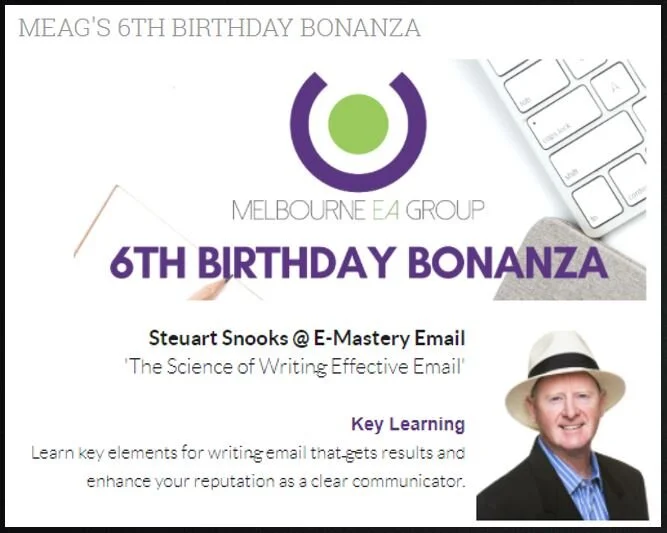Many of us protest that we ‘have to’ check e-mail first thing as “others expect a response from us early in the morning!” But is that really true?
Read MoreHow much time do we waste on e-mail?
Read MoreBy checking the inbox first thing in the morning you are immediately prioritising the ‘new’ ahead of all those important things you already have a commitment to (many of which arrived by email yesterday or earlier).
Read MoreDon’t allow yourself the easy ‘out’ by checking your email at the start of the day (or any random time it arrives) as a way of avoiding an important task at hand.
Read MoreAvoid checking email for as long as you can - any new information that arrives via email will only cause you to get distracted, lose focus and be less productive.
Read MoreManaging email effectively begins with having the ‘bigger picture’ of your overall workload and productivity in mind.
Read MoreIf you are checking email ’first thing’, you could be compromising your productivity.
Read MoreThe 4D Methodology to use when clearing your inbox.
Read More“I am about to describe an action whose benefits are almost magical. I say magical because whenever I do it, I cannot really explain why it works so well, but it always leaves me in awe. This magical thing is emptying my inbox”.
Read More"Attention is the bedrock to learning, memory, social connection, and happiness,"
says Barbara Jackson in her book ‘Distracted: The Erosion of Attention and The Coming Dark Age’.
And yet, at many schools and businesses, a culture is developing that rewards immediacy over focus, so that attending to what's new at any given moment takes precedence over long-term goals. So, what can do you about it?
Read MoreThe impact of email overload extends beyond the borders of the workplace. It also impacts our mental health and well-being. Keeping up with all the new inputs we receive from a wide range of technological devices takes up a lot of our time each day. This occurs not only at work but also during our personal time; we’re communicating ourselves into a frenzy. And it’s affecting our health in several ways. The first is chronic distraction and attention deficit disorder.
The second of these impacts is Stress.
Read MoreThe impact of email overload extends beyond the borders of the workplace. It also impacts our mental health and well-being. Keeping up with all the new inputs we receive from a wide range of technological devices takes up a lot of our time each day. This occurs not only at work but also during our personal time; we’re communicating ourselves into a frenzy. And it’s affecting our health in several ways. The first is chronic distraction and attention deficit disorder.
The second of these impacts is Stress.
Read MoreThis page contains resources and special offers for those who attended Steuart’s presentation at the Melbourne EA Group’s 6th Birthday Bonanza. Download the free ‘Cheat Sheets’ and the list of 50 Outlook Keyboard Shortcuts.
Read MoreThe impact of email overload extends beyond the borders of the workplace. It also impacts our mental health and well-being. The first of these impacts is Chronic distraction and Attention Deficit Disorder.
Read MoreLooking beyond the impact on individuals outlined in previous posts, one can also see the ‘knock on’ effect that information overload has on the many aspects of an organisation and some of its more critical processes. The fourth of these is: Ineffective Communication.
Read MoreLooking beyond the impact on individuals, one can also see the ‘knock on’ effect that information overload has on the many aspects of an organisation and some of its more critical processes. The third of these is: Workload Management.
Read MoreAfter all that we have been through, what’s that bet that the COVID vaccine will be available only in suppository form? Well that’s the innuendo (the Italian word for suppository).
Read MoreI just did a big load of pyjamas so I would have enough clean work clothes for this week.
Read MoreLooking beyond the impact of email overload on individuals, one can also see the ‘knock on’ effect it has on many aspects of an organisation and some of its more important processes. The second of these is . . .Meetings
Read More



















